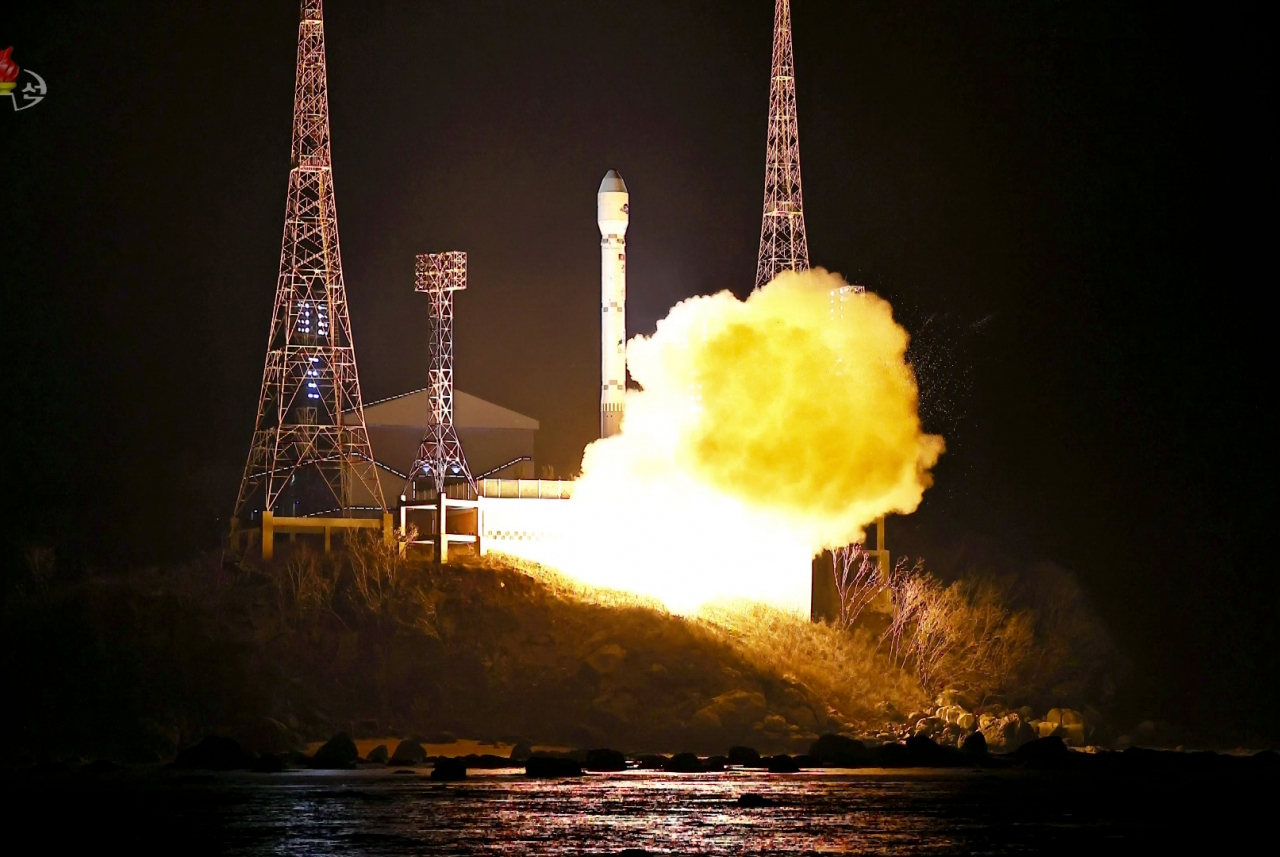North Korea scraps 2018 military pact with South Korea
Intel agency in Seoul believes Russian help behind Pyongyang’s first successful spy satellite launch
By Kim ArinPublished : Nov. 23, 2023 - 15:56

North Korea said Thursday it would step away from an inter-Korean military agreement reached on Sept. 19, 2018, vowing to deploy new and more advanced weapons along the shared border.
In a statement carried by the state-run Korean Central News Agency on Thursday, North Korea’s Defense Ministry said its forces “will not be bound by” the agreement that created a buffer zone around the fortified border, and that all military measures “will be restored immediately” in all spheres.
The unilateral withdrawal from the agreement comes a day after South Korea halted parts of the 2018 agreement aimed at easing front-line tensions. The tit-for-tat move was in protest of a military reconnaissance satellite North Korea launched Tuesday, a day earlier than previously announced. Seoul’s intelligence and military officials say the satellite, named Malligyong-1, succeeded in making it into orbit after two failed prior attempts.
South Korean Minister of National Defense Shin Won-sik has said North Korea putting the spy satellite into space would be a deal breaker.
Appearing before the National Assembly National Defense Committee on Thursday, the minister said South Korea was ready for a “swift and forceful response” should North Korea use the 2018 agreement’s partial suspension as an “excuse for additional provocations.”
He reiterated that North Korea putting the spy satellite into space amounted to a “clear violation” of relevant United Nations Security Council resolutions and a “grave provocation” that undermines the security of the international community.
“North Korea has once again demonstrated that it has zero intentions to abide by the pact it’s made with us,” he said.
The minister said suspending parts of the agreement had become necessary to restore reconnaissance and surveillance activities in border areas after North Korea repeatedly failed to live up to its commitments, most recently manifested by the third launch of a spy satellite.
The National Intelligence Service in Seoul believes North Korea had help from Russia in launching the spy satellite.
Following a closed-door briefing by NIS Director Kim Kyou-hyun, the Assembly Intelligence Committee’s executive secretary Rep. Yoo Sang-bum told reporters Thursday that Russian assistance likely expedited the success of the satellite’s launch, the required technology for which would have taken around three years to perfect otherwise.
The ruling party lawmaker quoted the NIS chief as saying it was not yet clear how advanced the satellite’s technology is, although an analysis of the retrieved debris from the first launch found that it was unable to take submeter resolution images.
The NIS thinks North Korea appears to have launched the satellite a day earlier than the date it told Japan in time for the “most optimal weather conditions,” Yoo said.
He added that the NIS chief does not think it likely for North Korea to attempt another launch within this year.
North Korean diplomat-turned-South Korean Assembly member Rep. Tae Yong-ho, echoed the defense minister’s remarks, saying he believes the agreement becoming defunct would “work out in our (South Korea's) favor.”
“North Korea has been taking all of the military steps it could possibly take behind our back, even stating several times that it’s deployed tactical nuclear weapons. All the while we were tied down from conducting surveillance near the borders,” he said in a statement Thursday.
He said South Korea, as the party which has “faithfully adhered to” the 2018 agreement, was “no longer shackled” to its constraints. “It is North Korea, not us, that should be nervous about the agreement no longer being in place.”
In Thursday’s statement, North Korea’s Defense Ministry admitted that the 2018 deal with South Korea had “long been invalidated, and turned into an empty facade,” warning of “a hefty price” that Seoul will be made to pay for “quashing the agreement.”
The North Korean ministry defended the spy satellite launch as “a legitimate and justifiable exercise of our sovereign right to self-defense” given the “increasingly worrisome military activities by enemies around the Korean Peninsula.”
Meanwhile, lawmakers who had served as previous President Moon Jae-in’s senior security and foreign affairs officials slammed the Yoon administration for initiating the dissolution of the 2018 agreement, which is considered one of the key achievements of the last Democratic Party of Korea president and his North Korean appeasement policy.
Rep. Youn Kun-young, who was Moon’s presidential secretary for state affairs planning and monitoring, said in a phone call with The Korea Herald on Thursday that South Korea, with its decision to suspend parts of the agreement, “played right into North Korea’s hands.”
“North Korea was already crying, and we gave them a good reason,” he said, calling South Korea giving North Korea the chance to do away with the agreement a “self-destructive move.”
Youn, who is still in regular contact with Moon as one of his closest aides, said while North Korea’s military provocations were “unacceptable and unforgivable,” eliminating an agreement because of a violation “does not make any sense.”
Youn and Moon’s former unification minister, Rep. Lee In-young, were among Democratic Party lawmakers who signed a statement on Wednesday that warned that the Yoon administration’s partial suspension of the agreement “could lead to it being abolished altogether.”



















![[Today’s K-pop] Treasure to publish magazine for debut anniversary](http://res.heraldm.com/phpwas/restmb_idxmake.php?idx=642&simg=/content/image/2024/07/26/20240726050551_0.jpg&u=)